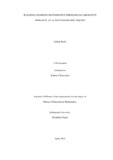
Please use this identifier to cite or link to this item:
https://hdl.handle.net/20.500.14301/240| Title: | TEACHING/ LEARNING MATHEMATICS THROUGH COLLABORATIVE APPROACH: AN AUTOETHNOGRAPHY INQUIRY |
| Authors: | Karki, Subash |
| Citation: | Karki,S.(2014).Teaching/Learning mathematics through collaborative approach: An autoethnographic inquiry. |
| Issue Date: | Apr-2014 |
| School: | SOED |
| Department: | DOSE |
| Level: | Masters |
| Program: | Master of Education in Mathematics Education |
| Abstract: | This dissertation attempts to portray my lived experience of doing mathematics as a learner, as a novice teacher, as a novice teacher trainer. Teaching/learning mathematics through collaboration approach It focuses on the paradigm shift of mathematics teaching learning from the traditional (teacher centered) approach to collaborative approach from the lens of autoethnography. Autoethnography as the genre of doing research connects the person to the culture, placing the self within a social context (Reed-Danahav, 1997, as cited in Sharma, 2012). This qualitative dissertation uses autoethnography as a methodology. Autoethnography is a research writing a story where the researcher is the subject and the researcher's experiences are the data (Ellis and Bochner, 2000, as cited in Stinson, 2009). It focuses on pedagogical growth and changes that I have witnessed from my early years of profession as a primary teacher to my most recent arrival in this research work. The purpose of this dissertation is to provide a personalized account of one mathematics learner to a novice teacher trainer’s use of reflective teaching/learning as an agent of change. This dissertation is about a journey of change in instruction ii fostered by a change of identity as a mathematics teacher to me and others towards transformative/constructivist approach of learning in terms of teacher-students relationship to maintain quality of education for future generation (Sharma, 2012). In this research, I have used interpretivisim, criticalsim postmodernism as supportive referents and paradigms to embrace the multi- paradigm research design .Moreover, to give a shape to my study; I have used other different theories, such as critical theory, constructivism and transformative learning theory as my direction. Interpretive research paradigm helped me to be subjective to address the emergent issues of teaching mathematics, and other more critical paradigm helped me to identify my research problem to critically reflect upon my teaching-learning experiences and to transform my teaching/learning from traditional approach to collaborative approach. In the process I have represented my stories has shown in the form of transformation during based on my research project. I have investigated that traditional teachers centered teaching learning strategy unhelpful dualisms to make our mathematics more meaningful. But as I have experienced of collaboration approach I can depict out this collaboration approach is more momentous than traditional approach teacher centered approach in teaching learning of mathematics. So my image to develop collaboration approach in teaching learning of mathematics between students and teachers focused in Nepalese context, this strategy has enhanced me with vision in developing new direction of teaching strategy for employing collaborative approach in mathematics. |
| URI: | https://hdl.handle.net/20.500.14301/240 |
| Appears in Collections: | Dissertation |
Files in This Item:
| File | Description | Size | Format | |
|---|---|---|---|---|
| SUBASH KARKI FINAL THESIS .pdf | 1.35 MB | Adobe PDF |  View/Open |
Items in DSpace are protected by copyright, with all rights reserved, unless otherwise indicated.